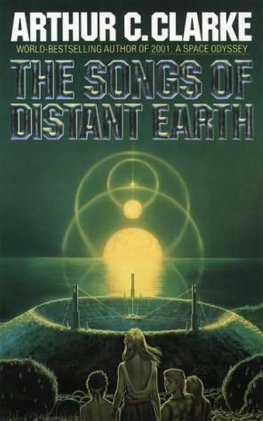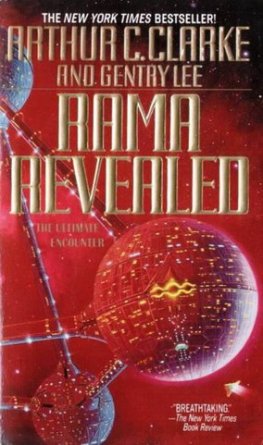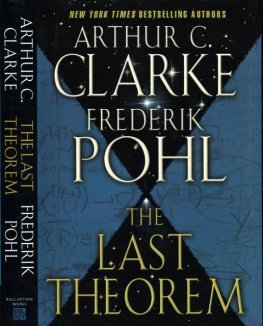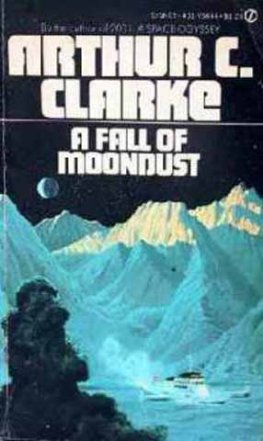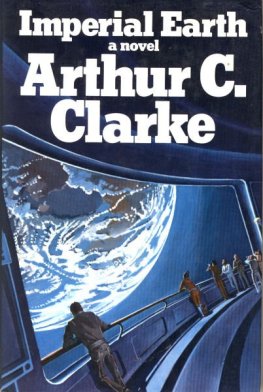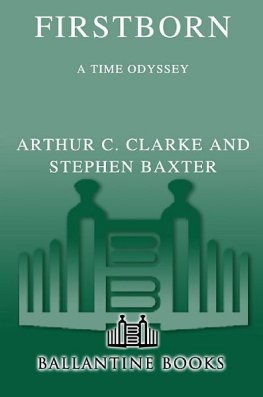Arthur C. Clarke
The Songs of Distant Earth
Nowhere in all space or on a thousand worlds will there be men to share our loneliness. There may be wisdom; there may be power; somewhere across space great nstruments may stare vainly at our floating cloud wrack, their owners yearning as we yearn. Nevertheless, in the nature of life and in the principles of evolution we have had our answer. Of men elsewhere, and beyond, there will be none forever
Loren Eiseley, The Immense Journey (1957)
I have written a wicked book, and feel spotless as the lamb.
Melville to Hawthorne (1851)
Del Rey
cover art by Michael Whelan
This novel is based on an idea developed almost thirty years ago in a short story of the same name (now in my collection The Other Side of the Sky). However, this version was directly and negatively inspired by the recent rash of space-operas on TV and movie screen. (Query: what is the opposite of inspiration expiration?)
Please do not misunderstand me: I have enormously enjoyed the best of Star Trek and the Lucas/Spielberg epics, to mention only the most famous examples of the genre. But these works are fantasy, not science fiction in the strict meaning of the term. It now seems almost certain that in the real universe we may never exceed the velocity of light. Even the very closest star systems will always be decades or centuries apart; no Warp Six will ever get you from one episode to another in time for next weeks instalment. The great Producer in the Sky did not arrange his programme planning that way.
In the last decade, there has also been a significant, and rather surprising, change in the attitude of scientists towards the problem of Extraterrestrial Intelligence. The whole subject did not become respectable (except among dubious characters like the writers of science fiction) until the 1960s: Shklovskii and Sagans Intelligent Life in the Universe (1966) is the landmark here.
But now there has been a backlash. The total failure to find any trace of life in this solar system, or to pick up any of the interstellar radio signals that our great antennae should be easily able to detect, has prompted some scientists to argue Perhaps we are alone in the Universe Dr Frank Tipler, the best-known exponent of this view, has (doubtless deliberately) outraged the Saganites by giving one of his papers the provocative title There Are No Intelligent Extra-Terrestrials. Carl Sagan et al argue (and I agree with them) that it is much too early to jump to such far-reaching conclusions.
Meanwhile, the controversy rages; as has been well said, either answer will be awe-inspiring. The question can only be settled by evidence, not by any amount of logic, however plausible. I would like to see the whole debate given a decade or two of benign neglect, while the radioastronomers, like gold-miners panning for dust, quietly sieve through the torrents of noise pouring down from the sky.
This novel is, among other things, my attempt to create a wholly realistic piece of fiction on the interstellar theme just as, in Prelude to Space (1951), I used known or foreseeable technology to depict mankinds first voyage beyond the Earth. There is nothing in this book which defies or denies known principles; the only really wild extrapolation is the quantum drive, and even this has a highly respectable paternity. (See Acknowledgements.) Should it turn out to be a pipe-dream, there are several possible alternatives; and if we twentieth-century primitives can imagine them, future science will undoubtedly discover something much better.
Arthur C. Clarke
COLOMBO, SRI LANKA
JULY 1985
Even before the boat came through the reef, Mirissa could tell that Brant was angry. The tense attitude of his body as he stood at the wheel the very fact that he had not left the final passage in Kumars capable hands showed that something had upset him.
She left the shade of the palm trees and walked slowly down the beach, the wet sand tugging at her feet. When she reached the waters edge, Kumar was already furling the sail. Her baby brother now almost as tall as she was, and solid muscle waved to her cheerfully. How often she had wished that Brant shared Kumars easygoing good nature, which no crisis ever seemed capable of disturbing
Brant did not wait for the boat to hit the sand, but jumped into the water while it was still waist-deep and came splashing angrily towards her. He was carrying a twisted mass of metal festooned with broken wires and held it up for her inspection.
Look! he cried. Theyve done it again!
With his free hand, he waved towards the northern horizon.
This time Im not going to let them get away with it! And the mayor can say what she damn well pleases!
Mirissa stood aside while the little catamaran, like some primeval sea-beast making its first assault on the dry land, heaved itself slowly up the beach on its spinning outboard rollers. As soon as it was above the high-water line, Kumar stopped the engine, and jumped out to join his still-fuming skipper.
I keep telling Brant, he said, that it must be an accident maybe a dragging anchor. After all, why should the Northers do something like this deliberately?
Ill tell you, Brant retorted. Because theyre too lazy to work out the technology themselves. Because theyre afraid well catch too many fish. Because
He caught sight of the others grin and sent the cats cradle of broken wires spinning in his direction. Kumar caught it effortlessly.
Anyway even if it is an accident, they shouldnt be anchoring here. That areas clearly marked on the chart: KEEP OUT RESEARCH PROJECT. So Im still going to lodge a protest.
Brant had already recovered his good humour; even his most furious rages seldom lasted more than a few minutes. To keep him in the right mood, Mirissa started to run her fingers down his back and spoke to him in her most soothing voice.
Did you catch any good fish?
Of course not, Kumar answered. Hes only interested in catching statistics kilograms per kilowatt that sort of nonsense. Lucky I took my rod. Well have tuna for dinner.
He reached into the boat and pulled out almost a metre of streamlined power and beauty, its colours fading rapidly, its sightless eyes already glazed in death.
Dont often get one of these, he said proudly. They were still admiring his prize when History returned to Thalassa, and the simple, carefree world they had known all their young lives came abruptly to its end.
The sign of its passing was written there upon the sky, as if a giant hand had drawn a piece of chalk across the blue dome of heaven. Even as they watched, the gleaming vapour trail began to fray at the edges, breaking up into wisps of cloud, until it seemed that a bridge of snow had been thrown from horizon to horizon.
And now a distant thunder was rolling down from the edge of space. It was a sound that Thalassa had not heard for seven hundred years but which any child would recognize at once.
Despite the warmth of the evening, Mirissa shivered and her hand found Brants. Though his fingers closed about hers, he scarcely seemed to notice; he was still staring at the riven sky.
Even Kumar was subdued, yet he was the first to speak.
One of the colonies must have found us.
Brant shook his head slowly but without much conviction.
Why should they bother? They must have the old maps theyll know that Thalassa is almost all ocean. It wouldnt make any sense to come here.
Scientific curiosity? Mirissa suggested. To see whats happened to us? I always said we should repair the communications link
This was an old dispute, which was revived every few decades. One day, most people agreed, Thalassa really should rebuild the big dish on East Island, destroyed when Krakan erupted four hundred years ago. But meanwhile there was so much that was more important or simply more amusing.

